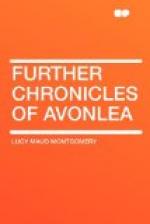The ceremony was to be performed at eight o’clock in the evening. At seven Rachel stood in her room, fully dressed and alone. She had no bridesmaid, and she had asked her cousins to leave her to herself in this last solemn hour of girlhood. She looked very fair and sweet in the sunset-light that showered through the birches. Her wedding gown was a fine, sheer organdie, simply and daintily made. In the loose waves of her bright hair she wore her bridegroom’s flowers, roses as white as a virgin’s dream. She was very happy; but her happiness was faintly threaded with the sorrow inseparable from all change.
Presently her mother came in, carrying a small basket.
“Here is something for you, Rachel. One of the boys from the harbor brought it up. He was bound to give it into your own hands—said that was his orders. I just took it and sent him to the right-about—told him I’d give it to you at once, and that that was all that was necessary.”
She spoke coldly. She knew quite well who had sent the basket, and she resented it; but her resentment was not quite strong enough to overcome her curiosity. She stood silently by while Rachel unpacked the basket.
Rachel’s hands trembled as she took off the cover. Two huge pink-spotted shells came first. How well she remembered them! Beneath them, carefully wrapped up in a square of foreign-looking, strangely scented silk, was the dragon teapot. She held it in her hands and gazed at it with tears gathering thickly in her eyes.
“Your father sent that,” said Isabella Spencer with an odd sound in her voice. “I remember it well. It was among the things I packed up and sent after him. His father had brought it home from China fifty years ago, and he prized it beyond anything. They used to say it was worth a lot of money.”
“Mother, please leave me alone for a little while,” said Rachel, imploringly. She had caught sight of a little note at the bottom of the basket, and she felt that she could not read it under her mother’s eyes.
Mrs. Spencer went out with unaccustomed acquiescence, and Rachel went quickly to the window, where she read her letter by the fading gleams of twilight. It was very brief, and the writing was that of a man who holds a pen but seldom.
“My dear little girl,” it ran, “I’m sorry I can’t go to your wedding. It was like you to ask me—for I know it was your doing. I wish I could see you married, but I can’t go to the house I was turned out of. I hope you will be very happy. I am sending you the shells and teapot you liked so much. Do you remember that day we had such a good time? I would liked to have seen you again before you were married, but it can’t be.
“Your
loving father,
“David
Spencer.”
Rachel resolutely blinked away the tears that filled her eyes. A fierce desire for her father sprang up in her heart—an insistent hunger that would not be denied. She must see her father; she must have his blessing on her new life. A sudden determination took possession of her whole being—a determination to sweep aside all conventionalities and objections as if they had not been.




